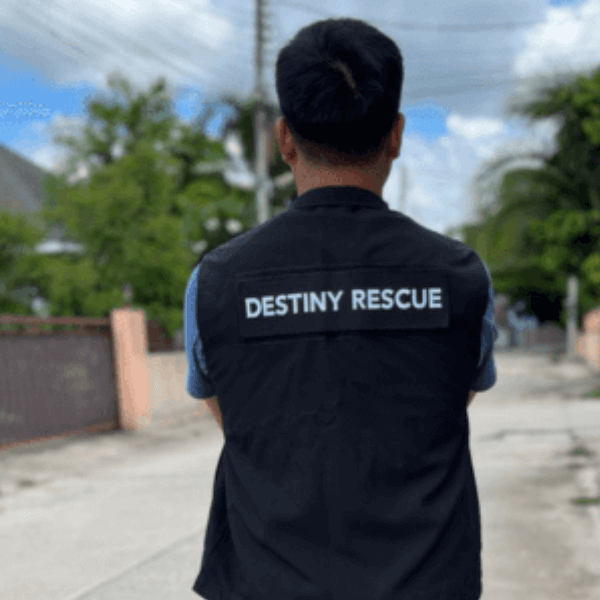Trigger Warning: this post includes mentions of entrapment, torture and suicide. Please read with discretion.
As Chakan drove down a two-lane road in an Asian country, the Destiny Rescue agent looked out his car window at a towering compound, vastly different from the surrounding town. The building looked vaguely like a massive new chain hotel that had been jammed into a disproportionately small city.
Despite the size of the strange facility, no people were entering or exiting the building. A closer inspection revealed only one obvious door, watched over by a single door guard.
Chakan estimated that this single compound might house as many as 10,000 residents and, in spite of the eerie stillness, they were all inside.
And most were victims of human trafficking.
Scammed into scamming
Facilities like this one have been popping up all over Asia. Funded by organised international crime groups, they employ tens of thousands of people forced to scam other victims all over the world.
The process is commonly called “pig butchering.” In the same way, a pig is fattened up before slaughter, these scammers build trust through bogus relationships and false promises with their targets before draining their bank accounts. Working on phones and computers, the trafficked scammers desperately try to convince their marks to send money to fake distant relatives or risk their life savings in complex investment scams.

Pig Butchering is a form of trafficking that’s arisen in recent years. Image in representational
Most of the residents are young, college-educated men from neighbouring countries. Lured by the promise of good money in a legitimate office, they are often brought across national borders, their passports taken upon arrival, leaving them powerless to escape.
This time-tested trafficking tactic immediately puts them at the mercy of their “employers.” With no way to get home and the threat of arrest, if they attempt a solo crossing, the trafficked people become completely dependent on the traffickers.
It’s a dependency the traffickers reinforce through a strict, regimented schedule. The scammers are worked in shifts, every movement planned, every meal supplied by their captors.
They have quotas to meet: if they fail to scam enough money out of their victims, the workers are often punished with beatings or electric shock torture. Habitually low earnings may end in being sold into other forms of exploitation, such as sex trafficking or manual labour trafficking.
During their off-hours, they are herded in groups of five to ten into a room that’s locked from the outside, where they try to get a little sleep before the process starts all over again.
The stress, as you might imagine, is incredible. With no egress possible through the guarded front door, many only see a single means of escape: taking their own life.
Our teams on the ground report several suicides a month, mostly as a result of compound residents throwing themselves from the roofs of the ominous buildings.

Despite the victims’ low earnings, the money generated is immense—at least $75 billion in cryptocurrency alone was generated by way of pig butchering from 2020 to 2024
Victims are only paid around AUS$3.86 a day, no matter how much they scam out of others.
They cannot get ahead, they cannot get out, and without passports, it’s nearly impossible to get home even if they did manage to sneak away.
Getting out
Escape from these compounds is very difficult. Chakan says that using official channels is often fruitless. For instance, if a resident manages to get a call out to family, they must contact their home embassy, which must contact the embassy where the trafficking is happening, which then tasks local police with retrieving the victim.
However, local police are often also controlled by the crime organisation that runs the compounds. If the police give forewarning to the criminals that they’re looking for a certain individual, the traffickers simply sell the individual to another compound, making one last profit from the poor soul. The traffickers can then say the person in question isn’t on their property.

Estimates for victims trapped in scamming call centres are in the hundreds of thousands
Corruption runs rampant. Even when the traffickers do release someone, the police must submit a letter to the traffickers asking for permission to retrieve the person at a specified time and date. The fact that police don’t raid or help the thousands of other victims is a startling indication of the criminals’ financial reach. And once that individual is released to the police, he has a whole new set of difficulties in trying to return home without a passport.
When Destiny Rescue is asked to help in those situations, one of our main tasks, beyond helping with immediate food and transportation needs, is helping the survivor be recognised as someone who needs help. Without a passport, their home embassies are apt to doubt the survivor’s story.
“They don’t see them as trafficking victims,” Chakan said. “They see them as criminals.”
Besides requiring mountains of paperwork, Chakan says that the process can take up to three months. The logistics of trying to get home in such a hostile climate can be overwhelming to an exhausted, traumatised survivor. Destiny Rescues comes in and acts as an advocate throughout the process to get the survivor home safely.
Using alternative methods

A Destiny Rescue agent wearing Destiny Rescue gear
But that’s not the only way we rescue.
Sometimes, one of our partners will contact us directly to request help getting someone out. We’ll coordinate with the victim in these cases to plan their escape.
This part can get touchy. The victims must be careful not to let the guards know they’re doing anything but continuing to scam. We’ll carefully work with the victim to coordinate a time they can slip away.
What makes this part even more nerve-wracking is that it can’t be done under the cover of night; the compounds are too locked down then. The escape must be done publicly, in the open, for our method to work.
During the little time the victims are given for daylight outside, our agents drive to the compound in a car and give the signal. At that point, it’s up to the survivor to make a dash to our vehicle. It’s critical that we make sure the “door guard,” who’s nothing more than a prison guard in truth, can see our car at this point. He won’t pursue the escapee while people are watching because that would spoil the facade that everyone is working there of their own free will.
Even at the point of rescue, the escapees are often hanging by a thread.

When the victims meet us, they’re scared,” Chakan said.
After all they’ve been through, trust is hard-earned. Getting into the car with another stranger is uncomfortably similar to the very way that became trafficked in the first place. We earn that trust over the following days as we care for the survivor and arrange travel home.
If you can’t ignore these cries for help, please consider partnering with us. Your gift can help bring the light of freedom to an oppressed person. Fill out the form below to make rescue possible today.


 US & International
US & International New Zealand
New Zealand United Kingdom
United Kingdom